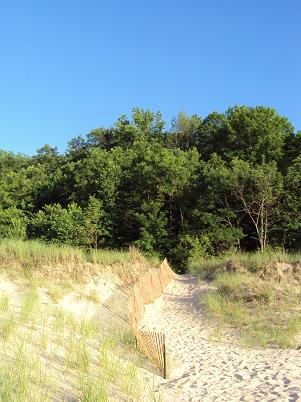I love the beach 365 days a year but especially on a day like today: 75 degrees, a light breeze, whitecaps and blasting sunshine.
While working from an old but comfy beach chair, God brought a distant memory to mind. Mom and I were walking together on the same stretch of sand, looking up at the dunes topped with greenery. It was a day like today except that it was 1955. The sky was then (just like today) a perfect example of “sky-blue.”
Without realizing it, Mom and I were thinking the same thing. “People say blue and green don’t go together,” she said. “But look what happens when God does it.”
If I’d known how to properly use the word “Amen” as a 10 year old, I would have. As it was, Mom planted one of those valuable line-on-line nuggets of wisdom in my young heart, and God’s Spirit caused it to take root. In the years since then, those roots have nourished an important idea:
God can do what people can’t.
It’s easy to apply that logic when mother and child are enjoying the scenery, but does it pertain to the monster-size crises of adulthood?
Examples abound:
- An addict surrenders to a “higher power” and learns his name is Jesus, committing to sobriety and spreading that good news.
- An abandoned child comes to Christ and grows up to lead a ministry dedicated to rescuing children from abuse.
- An imprisoned criminal becomes a Christian, and hatred morphs into love.
These are real-life examples of people I know. In each case God combined two “colors” that wouldn’t rationally “go together,” and the results were spectacular:
- Addiction/sobriety
- Abandonment/rescue
- Criminal behavior/loving actions.
So, what about the challenge of widowhood? The trouble-list is long: loneliness, fear, separation, sadness, and unwelcome change. What unlikely “color combinations” might God make available?
As we look at our list, we already know:
- Loneliness/companionship
- Fear/safety
- Separation/togetherness
- Sadness/joy
- Change/assistance
The trick is to open ourselves to these out-of-the-ordinary combos, to actively look for them. Before our husbands died, loneliness wasn’t a problem; we had their companionship. If we were afraid, they protected us. We were together, and it was joyful. But now our men are gone and can no longer be these things for us.
And so we look to God. And what we see is his gentle, steady bringing of the things we miss. He provides the positive counter-balance to every negative, meets our needs and brings a “green” to enhance every “blue”.
The alternative is to refuse his help, which leaves us stuck in the misery of loneliness, fear, separation and sadness. That would be like Mom and me walking home from the beach with our eyes on the asphalt.
“My God shall supply all your need…” (Philippians 4:19)






